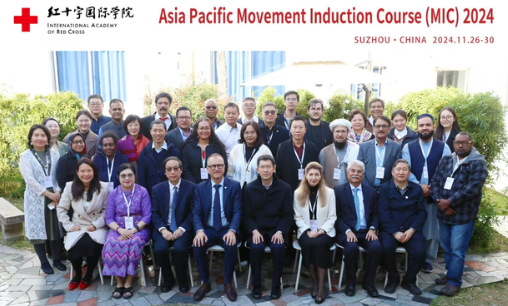
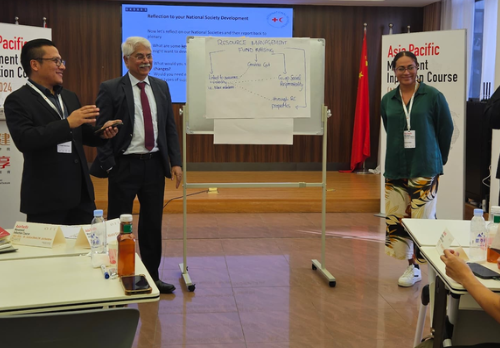 The Asia Pacific Induction Course 2024, organized by the International Federation of Red Cross and Red Crescent Societies (IFRC) in collaboration with the International Committee of the Red Cross and Red Crescent Societies, was a pivotal event hosted by the Chinese Red Cross Society and the International Academy of Red Cross and Red Crescent in Suzhou, China.
The Asia Pacific Induction Course 2024, organized by the International Federation of Red Cross and Red Crescent Societies (IFRC) in collaboration with the International Committee of the Red Cross and Red Crescent Societies, was a pivotal event hosted by the Chinese Red Cross Society and the International Academy of Red Cross and Red Crescent in Suzhou, China.
Dr. Justice M. Jaichandren, Member National Managing Body & Chairman, IRCS, Tamil Nadu state branch & Dr. A. Sridhar Reddy, Member National Managing Body & Chairman, IRCS, Andhra Pradesh State Branch attended the induction course. This course aimed to equip participants with essential knowledge and skills in good governance and leadership, crucial for enhancing humanitarian efforts across the region.
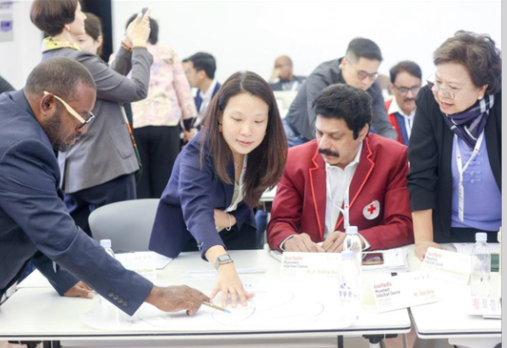 The primary objectives of the course were to strengthen the movement through cooperation and collaboration, promote humanitarian diplomacy, and implement the Hanoi Call for Action. This call emphasizes the need for a collective response to humanitarian challenges, encouraging national societies to work together towards common goals. By fostering an environment of collaboration, the course aimed to create a network of leaders who could effectively address pressing issues in their communities.
The primary objectives of the course were to strengthen the movement through cooperation and collaboration, promote humanitarian diplomacy, and implement the Hanoi Call for Action. This call emphasizes the need for a collective response to humanitarian challenges, encouraging national societies to work together towards common goals. By fostering an environment of collaboration, the course aimed to create a network of leaders who could effectively address pressing issues in their communities.
Key Themes Explored; Good Governance and Leadership, Humanitarian Diplomacy, The Hanoi Call for Action, Seville Agreement 2.0, Building and Maintaining National Societies, Purposeful Learning, Networking Opportunities.
Good Governance and Leadership
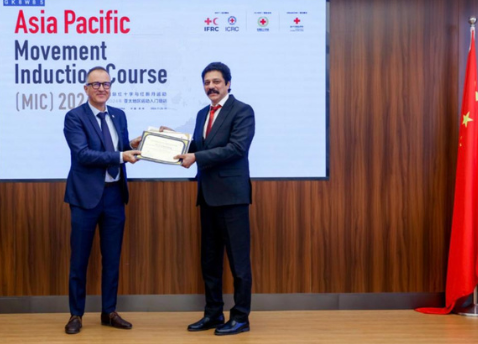 One of the core themes of the induction course was good governance. Effective governance is fundamental to the success of any organization, particularly within humanitarian contexts where transparency, accountability, and ethical leadership are paramount. Participants delved into best practices for governance, exploring frameworks that promote inclusivity and responsiveness to community needs. Leadership was another critical focus area. The course emphasized that effective leaders are not just decision-makers but also facilitators who empower others. Participants learned about different leadership styles and how adaptive leadership can help navigate complex humanitarian landscapes.
One of the core themes of the induction course was good governance. Effective governance is fundamental to the success of any organization, particularly within humanitarian contexts where transparency, accountability, and ethical leadership are paramount. Participants delved into best practices for governance, exploring frameworks that promote inclusivity and responsiveness to community needs. Leadership was another critical focus area. The course emphasized that effective leaders are not just decision-makers but also facilitators who empower others. Participants learned about different leadership styles and how adaptive leadership can help navigate complex humanitarian landscapes.
Humanitarian Diplomacy
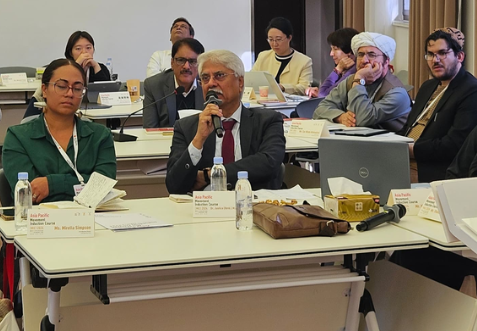 The concept of humanitarian diplomacy was integral to discussions during the course. Humanitarian diplomacy involves advocating for humanitarian principles and ensuring that these principles are respected in conflict zones and disaster-affected areas. The course highlighted strategies for effective advocacy, negotiation skills, and building relationships with stakeholders at various levels. Participants were encouraged to engage in dialogue with governments, non-governmental organizations (NGOs), and other relevant entities to promote humanitarian action.
The concept of humanitarian diplomacy was integral to discussions during the course. Humanitarian diplomacy involves advocating for humanitarian principles and ensuring that these principles are respected in conflict zones and disaster-affected areas. The course highlighted strategies for effective advocacy, negotiation skills, and building relationships with stakeholders at various levels. Participants were encouraged to engage in dialogue with governments, non-governmental organizations (NGOs), and other relevant entities to promote humanitarian action.
The Hanoi Call for Action
The Hanoi Call for Action served as a guiding framework throughout the course. This initiative calls for enhanced cooperation among national societies to address emerging global challenges such as climate change, migration, and pandemics. By aligning their efforts with this call, participants were encouraged to think critically about how they could contribute to regional solutions while respecting local contexts.
Seville Agreement 2.0
Another significant aspect of the course was an exploration of the Seville Agreement 2.0, which outlines key principles for effective humanitarian action. This agreement emphasizes coordination among humanitarian actors, ensuring that responses are timely and efficient. Participants engaged in discussions about how these principles can be applied in their respective contexts, fostering a culture of collaboration that transcends organizational boundaries.
Building and Maintaining National Societies
A vital component of the training involved strategies for building and maintaining national societies. Participants learned about organizational development, capacity building, and sustainability practices necessary for thriving national societies. The course provided tools for assessing organizational strengths and weaknesses, enabling participants to develop actionable plans for improvement.
The Asia Pacific Induction Course 2024 was not just an educational program; it was a transformative experience that provided participants with new perspectives on good governance and leadership within humanitarian contexts. The emphasis on cooperation, humanitarian diplomacy, and adherence to established frameworks like the Hanoi Call for Action and Seville Agreement 2.0 equipped attendees with practical tools to enhance their operational effectiveness.
As participants returned to their respective national societies armed with fresh insights and strengthened networks, they were better prepared to tackle the complex challenges facing their communities. The course underscored the importance of collaboration in advancing humanitarian efforts across the Asia Pacific region, ultimately contributing to a more resilient global community committed to alleviating human suffering through effective governance and leadership.
